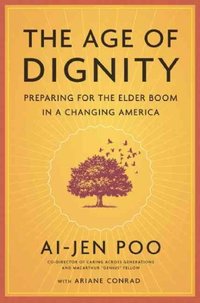Published in the St. Louis American, December 24, 2015
 I’ve been learning to grow old gracefully from my mother. She has embraced aging with elegance but also with a determination to be healthy and independent. It sounds like a realistic plan.
I’ve been learning to grow old gracefully from my mother. She has embraced aging with elegance but also with a determination to be healthy and independent. It sounds like a realistic plan.
Before I reached that bewitching age of 65 this year, I read “The Age of Dignity: Preparing for the Elder Boom in a Changing America” by Ai-Jen Poo. Ai-Jen heads up the powerful National Domestic Workers Alliance made up of millions of nannies, housekeepers and caregivers. She was supposed to be the featured speaker at the Workers’ Rights Board annual meeting but her flight grounded her in Chicago. Her book was on sale at the event so I bought it.
In this country, anything old has little value and is discarded. If you’re black and female, your prospects become quite dim. So, you may have it in your head to grow old with dignity, but the rest of society is hell-bent on treating seniors like they’re all hard of hearing and with no intelligence. That’s why some youngsters talk to them in loud, slow sentences.
I’m one of the 76 million baby boomers. Our impact on all facets of U.S. society is undisputable. What will be our impact on that society as we all grow old at the same time? By 2029, all of the baby boomers will be 65 years or older; 20 percent of the total U.S. population will be over the age of 65. By 2035, the number of Americans over the age of 85 years old will double.
“The Age of Dignity” describes the current situation, one where Social Security payments are stagnant, healthcare costs are skyrocketing, more elders live in poverty and the numbers of senior citizens needing in-home care are increasing. Just as the book is about to get depressing, you start reading inspirational stories about wonderful, underpaid professionals who are committed to taking care of clients in their own home. These caregivers are often underpaid and receive no benefits.
These are the converging issues that demand a new attitude about aging and a care plan – a care plan for the both the client and the caretaker.
The book’s goal is to sound the alarm for an impending crisis as baby boomers grow older and the demand for home healthcare workers and caregivers also increases. These issues, along with other associated issues like rising pharmaceutical costs, don’t seem to be on the agenda of our legislators.
It’s in everyone’s best interests to put a humane plan into place now that gives the country’s budget time to absorb this huge group into the fold. It also gives us the opportunity to fight against the government’s tendency to throw out a bone, tell us that’s all there is, and pit us against one another. I see baby boomers potentially being pitted against millennials or even against the babies being born now.
Ai-Jen Poo asserts that all of the programs related to aging and care – such as Social Security, Medicaid and Medicare – and all related policies and legislation, like the Older Americans Act, will need overhauling. We’re at a crossroads, and what decisions we make now (or don’t make!) will determine how a significant sector of our society will be viewed and cared for.
I accept the fact that I’m getting older and that one day I will need some additional assistance to thrive. What‘s difficult to accept is that I’ll have to use my energy in my golden years to fight for resources and dignity.



